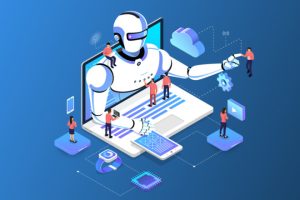The rise of artificial intelligence (AI) has brought a revolution in how businesses engage with their customers. From personalized product recommendations to 24/7 customer support, AI has significantly enhanced the customer experience (CX) across various industries. In today’s fast-paced, technology-driven world, delivering a seamless customer experience is more important than ever, and AI is at the forefront of this transformation.
This article explores how AI is reshaping customer experience, the key technologies driving this change, the benefits businesses are reaping, real-world examples, the challenges involved, and what the future holds for AI in CX.
1. What is AI in Customer Experience?

AI in customer experience refers to the use of artificial intelligence technologies to enhance and streamline customer interactions. This can include AI-powered chatbots, voice assistants, recommendation systems, and customer support automation. AI helps businesses understand customer needs better, predict behavior, and offer personalized solutions at scale.
For example, AI can analyze massive amounts of customer data in real-time, enabling businesses to tailor their services and offerings to individual preferences. It integrates seamlessly with existing platforms like CRM (Customer Relationship Management) systems, allowing for a more efficient and personalized interaction with customers.
In essence, AI enables businesses to deliver a more dynamic and responsive customer experience, whether it’s through automated responses to inquiries, analyzing feedback, or predicting what a customer might need next.
2. Key Technologies Driving AI in CX
Natural Language Processing (NLP)
NLP allows machines to understand and interpret human language. It enables AI-powered chatbots and virtual assistants to converse with customers in a natural, human-like manner. For instance, companies like Google and Amazon use NLP in their voice assistants (Google Assistant, Alexa) to understand and respond to customer queries.
Machine Learning (ML)
Machine learning is at the heart of AI’s predictive power. It enables systems to learn from past interactions and improve over time. For example, Netflix’s recommendation engine uses ML to analyze viewing habits and suggest content that users are most likely to enjoy.
Computer Vision
In retail and e-commerce, computer vision allows businesses to personalize in-store and online shopping experiences. Visual search engines, such as those used by platforms like ASOS, let customers search for products by uploading images, making shopping more intuitive.
AI-Powered Analytics
AI can process large volumes of customer data, providing valuable insights that help businesses understand customer preferences, behaviors, and pain points. This helps companies anticipate needs and optimize their offerings. AI-powered analytics tools can track customer sentiment, analyze reviews, and predict future trends, enabling businesses to stay ahead of the competition.
3. Benefits of AI in Customer Experience
24/7 Customer Support
AI-powered chatbots and virtual assistants can operate around the clock, ensuring that customers receive timely assistance even outside of regular business hours. This improves customer satisfaction by providing immediate answers to queries without the need for human intervention. For instance, many e-commerce platforms use chatbots to handle common customer inquiries like order tracking and returns, which frees up human agents for more complex tasks.
Personalization at Scale
Personalization is a key driver of customer satisfaction, and AI makes it possible to deliver highly personalized experiences at scale. AI systems can analyze individual customer data and provide tailored product recommendations, personalized emails, and targeted offers. Companies like Amazon excel in this area, using AI to suggest products based on browsing history, past purchases, and customer preferences.
Improved Response Times
With AI handling routine queries and automating processes, businesses can significantly reduce response times. AI chatbots can provide instant responses to frequently asked questions, while AI-powered analytics can predict what a customer needs and address issues before they arise. This not only enhances customer satisfaction but also improves overall efficiency.
Cost Efficiency

AI-driven customer experience solutions reduce the need for large customer service teams, thereby cutting operational costs. By automating routine tasks, businesses can focus their resources on more strategic initiatives. For example, implementing AI chatbots or AI-driven self-service portals can significantly reduce the costs associated with hiring and training human agents.
Data-Driven Insights
AI’s ability to process and analyze large datasets allows businesses to gain deep insights into customer behavior, preferences, and pain points. These insights can inform product development, marketing strategies, and customer service improvements. For instance, AI analytics tools can track customer sentiment across social media platforms, helping companies address negative feedback promptly.
4. Examples of AI Enhancing Customer Experience
Chatbots in E-commerce
E-commerce giants like Amazon and Alibaba use AI-powered chatbots to assist customers with real-time queries, such as tracking orders, answering product-related questions, and resolving complaints. These chatbots improve response times and provide a seamless shopping experience, leading to higher customer satisfaction.
AI in Financial Services
AI is transforming customer experience in financial services with the advent of robo-advisors. These AI-driven platforms offer personalized financial advice based on user data and preferences. Companies like Betterment and Wealthfront use robo-advisors to recommend investment strategies, manage portfolios, and help customers achieve their financial goals.
AI in Retail
Retailers are leveraging AI to create more personalized shopping experiences. For example, Zara uses AI to analyze customer feedback and predict fashion trends. This enables the company to produce clothing that meets customer demand and reduce excess inventory. Similarly, ASOS has implemented visual search technology, allowing customers to search for items by uploading images, making shopping more intuitive.
AI in Healthcare
Healthcare organizations are utilizing AI to improve patient experience. Virtual assistants like Babylon Health’s chatbot provide quick responses to patient inquiries, helping them book appointments, answer medical questions, and even perform preliminary diagnoses. This reduces the strain on healthcare professionals while ensuring patients receive timely care.
5. Challenges of Implementing AI in Customer Experience
Data Privacy Concerns
One of the significant challenges of using AI in customer experience is ensuring data privacy. Customers are increasingly concerned about how their data is being used, and businesses must ensure they are transparent and compliant with regulations such as GDPR. Mishandling data can lead to a loss of trust and reputational damage.
Human-AI Balance
While AI can handle many customer service tasks, there’s still a need for human involvement, especially in complex or emotionally charged situations. Striking the right balance between AI-driven automation and human interaction is essential for businesses to maintain a positive customer experience.
Bias in AI Systems
AI systems can sometimes exhibit bias, leading to unfair treatment of certain customer groups. For instance, recommendation engines might prioritize certain products based on biased data. To overcome this, companies must ensure their AI models are trained on diverse datasets and are regularly audited for fairness.
6. How Companies Are Leveraging AI to Improve CX
Case Study 1: Netflix
Netflix uses AI to deliver personalized content recommendations to its users. By analyzing viewing habits, preferences, and user interactions, the company’s recommendation engine suggests movies and shows that are likely to resonate with individual viewers. This level of personalization has been key to Netflix’s success in retaining subscribers and enhancing the overall user experience.
Case Study 2: Spotify
Spotify uses AI to analyze users’ listening habits and generate personalized playlists, such as “Discover Weekly.” By leveraging machine learning algorithms, Spotify curates music that matches each listener’s tastes, creating a more engaging and enjoyable user experience.
Case Study 3: Sephora
Sephora has integrated AI into its customer experience through virtual beauty assistants. These AI-powered tools provide personalized product recommendations, makeup tutorials, and skin care advice based on customer preferences and previous purchases. This level of personalization has helped Sephora stand out in the highly competitive beauty industry.
7. The Future of AI in Customer Experience

As AI technology continues to evolve, we can expect even more sophisticated applications in customer experience. AI will play a crucial role in creating omnichannel experiences, where customers can seamlessly switch between online and offline interactions. AI-driven virtual assistants and chatbots will become more human-like, capable of handling more complex queries and providing emotional intelligence in interactions.
In the next 5-10 years, AI could transform customer experience further by enabling hyper-personalized marketing, predictive customer support, and immersive virtual shopping experiences through augmented and virtual reality.
Conclusion
AI is transforming the customer experience landscape, providing businesses with the tools they need to deliver personalized, efficient, and cost-effective solutions. By leveraging AI technologies like NLP, machine learning, and AI-powered analytics, companies can create deeper connections with their customers, anticipate their needs, and provide a seamless experience across all touchpoints.
As AI continues to evolve, businesses that invest in AI-driven customer experience strategies will have a competitive edge, ensuring that they not only meet but exceed customer expectations.




